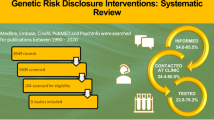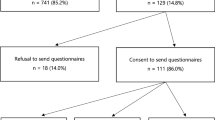Abstract
Genomic testing expansion is accompanied by an increasing need for genetic counselling and intrafamilial communication. Genetic counselling can play an important role in facilitating intrafamilial communication and relationships. We conducted a cross-sectional, multicenter study including 252 Italian women, using a questionnaire divided in two sections, the first one to be filled after the pre-test counselling and the second after receiving BRCA test results. We assessed the factors influencing intrafamilial disclosure of genetic information for hereditary breast and ovarian cancer, family members with whom probands are more prone to share genetic information, and the perceived understanding of information received by counselees during genetic counselling. Women were accompanied to the counselling more often by their husband/partner. Among those with a positive BRCA test result, 49% intended to communicate it to their offspring and 27% to their husband/partner. Younger women, those living with their husband/partner, and those who described family communication as open/profound and spontaneous/sincere had a higher probability of being accompanied during genetic counselling and discuss about it with relatives. Spontaneous/sincere or open/profound family communication and joyful/happy familial relationships were associated with the decision to undergo genetic testing as a responsibility towards relatives. Women had a good understanding of counselling contents (mean score 9.27 in a scale 1–10). Genetic counselling providers should consider that genetic information disclosure does not depend only on the clarity of the information provided, but also on pre-existing intrafamilial communication and relationships, family structure and marital status, indicating the need for a personalised approach accounting for these factors.
This is a preview of subscription content, access via your institution
Access options
Subscribe to this journal
Receive 12 print issues and online access
$259.00 per year
only $21.58 per issue
Buy this article
- Purchase on SpringerLink
- Instant access to the full article PDF.
USD 39.95
Prices may be subject to local taxes which are calculated during checkout


Similar content being viewed by others
Change history
19 September 2020
An amendment to this article has been published and can be accessed via a link at the top of the article.
23 September 2020
An amendment to this paper has been published and can be accessed via a link at the top of the paper.
References
Balmana J, Diez O, Rubio IT, Cardoso F, ESMO Guidelines Working Group. BRCA in breast cancer: ESMO clinical practice guidelines. Ann Oncol. 2011;22:vi31–4.
Kuchenbaeker KB, Hopper JL, Barnes DR, Phillips KA, Mooij TM, Roos-Blom MJ, et al. Risks of breast, ovarian, and contralateral breast cancer for BRCA1 and BRCA2 mutation carriers. JAMA. 2017;317:2402–16.
Domchek SM, Friebel TM, Singer CF, Evans DG, Lynch HT, Isaacs C, et al. Association of risk-reducing surgery in BRCA1 or BRCA2 mutation carriers with cancer risk and mortality. JAMA. 2010;304:967–75.
Katapodi MC, Northouse RN, Pierce P, Williams RA. Differences between women who pursued genetic testing for hereditary breast and ovarian cancer and their at-risk relatives who did not. Oncol Nurs Forum. 2011;38:572–81.
Meisel SF, Fraser LSM, Side L, Gessler S, Hann KEJ, Wardle J. Anticipated health behavior changes and perceived control in response to disclosure of genetic risk of breast and ovarian cancer: a quantitative survey study among women in the UK. BMJ Open. 2017;7:e017675.
Mahoney MC. Breast cancer risk reduction and counselling: lifestyle, chemoprevention, and surgery. J Natl Compr Canc Netw. 2007;5:702–10.
Hodgson JM, Metcalfe SA, Aitken M, Donath SM, Gaff CL, Winship IM, et al. Improving family communication after a new genetic diagnosis: a randomised controlled trial of a genetic counselling intervention. BMC Med Genet. 2014;15:33.
Nycum G, Avard D, Knoppers BM. Factors influencing intrafamilial communication of hereditary breast and ovarian cancer genetic information. Eur J Hum Genet. 2009;17:87–880.
Koehly LM, Peterson SK, Watts BG, Kempf KKG, Vernon SW, Gritz ER. A social network analysis of communication about hereditary nonpolyposis colorectal cancer genetic testing and family functioning. Cancer Epidemiol Biomarkers Prev. 2003;12:304–13.
Rolland JS. Genetics, family systems, and multicultural influences. Fam Syst Health. 2006;24:425–41.
Mendes A, Metcalfe A, Paneque M, Sousa L, Clarke AJ, Sequeiros J. Communication of information about genetic risks: putting families at the center. Fam Process. 2017;57:836–46.
Hoskins LM, Roy K, Peters JA, Loud JT, Greene MH. Disclosure of positive BRCA1/2-mutation status in young couples: the journey from uncertainty to bonding through partner support. Fam Syst Health. 2008;26:296–316.
Claes E, Evers-Kiebooms G, Boogaerts A, Decruyenaere M, Denayer L, Legius E. Communication with close and distant relatives in the context of genetic testing for hereditary breast and ovarian cancer in cancer patients. Am J Med Genet. 2003;116A:11–9.
Elrick A, Ashida S, Ivanovich J, Lyons S, Biesecker BB, Goodman MS, et al. Psychosocial and clinical factors associated with family communication of cancer genetic test results among women diagnosed with breast cancer at a young age. J Genet Couns. 2017;26:173–81.
Keenan KF, McKee L, Miedzybrodzka L. Genetics professionals’ experiences of facilitating parent/child communication through the genetic clinic. J Genet Couns. 2020;29:44–55.
Pollard S, Kalloger S, Weymann D, Sun S, Nuk J, Schrader KA, et al. Genetic testing for hereditary cancer syndromes: patient recommendations for improved risk communication. Health Expect. 2020;00:1–9.
McDaniel SH, Rolland JS, Feetham SL, Miller SM. “It runs in the family”: family systems concepts and genetically linked disorders. In: Miller SM, McDaniel SH, Rolland JS, Feetham SL, editors. Individuals, families, and the new era of genetics: biopsychosocial perspectives. New York: W.W. Norton & Company; 2006. p. 118–318.
Kenen R, Arden-Jones A, Eeles R. Healthy women from suspected hereditary breast and ovarian cancer families: the significant others in their lives. Eur J Cancer Care. 2004;13:169–79.
Julian-Reynier C, Eisinger F, Chabal F, Lasset C, Nogues C, Stoppa-Lyonnet D, et al. Disclosure to the family of breast/ovarian cancer genetic test results: patient’s willingness and associated factors. Am J Med Genet. 2000;94:13–8.
Gilbar R. Communicating genetic information in the family: the familial relationship as the forgotten factor. J Med Ethics. 2007;33:390–93.
Speice J, McDaniel SH, Rowley PT, Loader S. Family issues in a psychoeducation group for women with a BRCA mutation. Clin Genet. 2002;62:121–7.
Hughes C, Lerman C, Schwartz M, Peshkin BN, Wenzsel L, Narod S, et al. All in the family: evaluation of the process and content of sisters’ communication about BRCA1 and BRCA2 genetic test results. Am J Med Genet. 2002;107:143–50.
Patenaude AF, Dorval M, DiGianni LM, Schneider KA, Chittenden A, Garber JE, et al. Sharing BRCA1/2 test results with first degree relatives: factors predicting whom women tell. J Clin Oncol. 2005;24:700–6.
D’Agincourt-Canning L. Experiences of genetic risk: disclosure and the gendering of responsibility. Bioethics. 2001;15:231.
Metcalfe A, Coad J, Plumridge GM, Gill P, Farndon P. Family communication between children and their parents about inherited genetic conditions: a meta-synthesis of the research. Eur J Hum Genet. 2008;16:1193–200.
Van Oostrom I, Meijers-Heijboer H, Duivenvoorden HJ, van Gool AR, Seynaeve C, Meer CA, et al. Social and behavioral research in clinical genetics. Clin Genet. 2007;71:35–42.
Black L, McClellan KA, Avard D, Knoppers BM. Intrafamilial disclosure of risk for hereditary breast and ovarian cancer: points to consider. J Community Genet. 2013;4:203–14.
Foster C, Eeles R, Arden-Jones A, Moynihan C, Watson M. Juggling roles and expectations: dilemmas faced by women talking to relatives about cancer and genetic testing. Psychol Health. 2004;19:439–55.
Chalmers K, Marles S, Tataryn D, Scott-Findlay S, Serfas K. Reports of information and support needs of daughters and sisters of women with breast cancer. Eur J Cancer Care. 2003;12:81–90.
Elwyin G, Gray J, Clarke AJ. Shared decision making and nondirectiveness in genetic counselling. J Med Genet. 2000;37:135–8.
Mendes Á, Paneque M, Sousa L, Clarke A, Sequeiros J. How communication of genetic information within the family is addressed in genetic counselling: a systematic review of research evidence. Eur J Hum Genet. 2016;24:315–25.
Jacobs C, Patch C, Michie S. Communication about genetic testing with breast and ovarian cancer patients: a scoping review. Eur J Hum Genet. 2019;27:511–24.
Gaff C, Hodgson J. A genetic counselling intervention to facilitate communication about inherited conditions. Eur J Hum Genet. 2014;23:914–23.
Abacan MA, Alsubaie L, Barlow-Stewart K, Caanen B, Cordier C, Courtney E, et al. The global state of the genetic counsling profession. Eur J Hum Genet. 2019;2:183–97.
SPRinG Collaboration. Developing an intervention to facilitate family communication about inherited genetic conditions, and training genetic counsellors in its delivery. Eur J Hum Genet. 2016;24:794–802.
Mendes A, Chiquelho R, Santos T, Sousa L. Family matters: examining a multifamily group intervention for women with BRCA mutations in the scope of genetic counselling. J Community Genet. 2010;1:161–8.
Author information
Authors and Affiliations
Corresponding author
Ethics declarations
Conflict of interest
The authors declare that they have no conflict of interest.
Additional information
Publisher’s note Springer Nature remains neutral with regard to jurisdictional claims in published maps and institutional affiliations.
Supplementary information
Rights and permissions
About this article
Cite this article
Di Pietro, M.L., Zaçe, D., Orfino, A. et al. Intrafamilial communication of hereditary breast and ovarian cancer genetic information in Italian women: towards a personalised approach. Eur J Hum Genet 29, 250–261 (2021). https://doi.org/10.1038/s41431-020-00723-7
Received:
Revised:
Accepted:
Published:
Version of record:
Issue date:
DOI: https://doi.org/10.1038/s41431-020-00723-7
This article is cited by
-
BRCA cascade counselling and testing in Italy: current position and future directions
BMC Cancer (2025)
-
Changes in life decisions and in emotions following genetic testing for cancer risk
BMC Psychology (2025)
-
Public perspectives on healthcare professional-directed communication of hereditary genetic risks: a mixed-method systematic review
European Journal of Human Genetics (2025)
-
“Would you want to know?” Questions of utility and responsibility in Italian laypersons’ preferences about genetic risk communication
Journal of Community Genetics (2025)
-
Developing a questionnaire to explore lay people’s preferences for communicating hereditary conditions within families: insights from a cognitive interview study
Journal of Community Genetics (2025)



